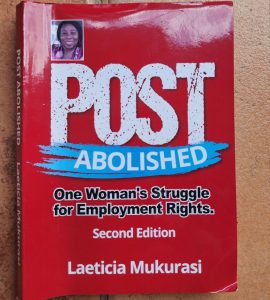Revisiting Post Abolished 40 Years Later: Why This Story Must Be Retold
………………………………………………………………….
NEARLY four decades ago, a single letter altered the course of one woman’s life. The letter from her boss – brief, brutal and final – declared: “Your post has been abolished with immediate effect.” It was an abrupt summary dismissal!
What looked like an administrative decision was in fact patriarchy dressed as economics, bureaucracy weaponized against a woman who refused to surrender.
The employee’s choice was clear: remain silent and disappear or fight back and risk everything. She chose the latter. Her legal battle became a landmark, forcing Tanzanian institutions to reckon with the abuse of “abolition of post” as a tool to eliminate employees without due process.
Her story became part of a broader movement that contributed to the Employment and Labour Relations Act (ELRA) of 2004. The law exists today because people like her refused to accept erasure.
………………………………………………………………………..

In 1991, Laeticia Mukurasi published Post Abolished: One Woman’s Struggle for Employment Rights in Tanzania, documenting her fight against unfair dismissal. The book quickly became more than a memoir – it became a survival guide, a warning and a rallying cry for workers who dared to challenge injustice.
Forty years later, Laeticia returned to her story. In the Second Edition (2023), she revisits the struggle with new eyes, reflecting not only on her own battle but on the decades of labour reform, workplace struggles and unfinished fights that followed.
She writes at a time when workers across Africa still face precarious employment, gender discrimination and the silencing power of authority.
Why revisit a story from the 1980s? Because injustice has not gone away. If anything, it has taken new forms – the same injustices in new clothes:
Job insecurity is worsening through short-term contracts, casualization, and outsourcing.
Union suppression persists, with workers discouraged from organizing.
Gender inequality remains entrenched, with women concentrated in the lowest-paying jobs.
Legal loopholes continue to allow employers to mask dismissal as “restructuring.”

Laeticia’s decision to reopen her case for today’s readers is both a gift and a warning: the fight for fair labour is never over.
The heart of Post Abolished remains the same: the chilling dismissal letter that sought to erase years of service with a single line.
For workers, Post Abolished is more than literature – it is armour. The book shows how injustice operates: through delays, intimidation and technical loopholes.
It reveals how employers weaponize silence and how victory in court can still mean defeat in practice if rulings are ignored. But it also offers tools of survival.
Knowledge of rights. Persistence in the face of despair. Solidarity with others who face similar battles. Laeticia turns her pain into strategy, offering today’s employees not just sympathy, but a roadmap.
Reading this new edition, one feels the urgency of her message: workers must be vigilant, must be prepared and must never assume that justice is automatic.
The new edition reanimates the tension of those courtroom battles, where every delay was a tactic, every technicality a weapon. Readers feel the exhaustion of waiting, the despair of being sidelined and the rare but powerful moments when truth cuts through legal fog.
For employees, this drama is not entertainment, it is an example. They see their own fears mirrored: losing income overnight, facing stigma after dismissal and being pressured to walk away quietly.
But Laeticia’s story refuses despair. Each page insists that even the weakest individual can bend the arc of justice, if only they refuse to let their case be buried.
In revisiting her book 40 years later, Laeticia sharpens the gendered lens of her struggle. Her dismissal was not only administrative – but also a reflection of a system where women who speak up are labeled as “defiant,” where competence is dismissed as arrogance and where men’s authority is protected at all costs.
This is why Post Abolished matters today. It exposes how patriarchal norms seep into workplace behaviour, often hidden under the cloak of “neutral” (or gender-blind) procedures. It reminds us that until gender inequality is confronted, workers’ rights remain incomplete.
For women workers, especially, the book is both a mirror and a call to arms: a mirror reflecting their lived experiences of discrimination, sidelining, dismissal and a call to arms showing that silence is the greatest weapon of injustice.
What makes this new edition remarkable is the final chapter, one that could not have been written 40 years ago. Here, Laeticia eflects on her struggle not as an ending, but as a handover. She writes of “passing on the baton”, the responsibility to continue the fight for justice from one generation to the next.

She acknowledges that ELRA 2004 brought progress but insists: the work is far from done. Workers are still dismissed unfairly. Women are still sidelined. Court victories are still undermined by weak enforcement.
By framing her story as a baton, Mukurasi ensures that her pain becomes fuel for future struggles. She hands workers a torch lit with resilience and says: take it further than I could. For today’s employees, Post Abolished is not history – it is a manual for survival. It reminds them that injustice never disappears by itself; it must be fought, case by case, generation by generation.
At its core, Post Abolished is about refusing to be buried. A dismissal letter tried to erase a career. Ignoring a Tribunal’s ruling tried to bury a victory. Patriarchal norms tried to bury a voice. But forty years later, Laeticia Mukurasi writes again, louder than before.
By revisiting her story, she ensures it cannot be forgotten. She transforms one woman’s pain into a collective memory, one worker’s struggle into a shared warning, one dismissal into a movement. She leaves every reader with a haunting question, one that transcends time, law and workplace:
When your dignity and livelihood are stripped away unjustly with the stroke of a pen, what will you do?
………………………………………………………………………..
GET YOUR COPY
Post Abolished: One Woman’s Struggle for Employment Rights in Tanzania – Second Edition (2023) is available in Dar es Salaam at:
– Tanzania Publishing House on Samora Machel Avenue,
– House of Wisdom at NHS House, Mezzanine Floor No. 22 on Samora Machel Avenue,
– The Dar es Salaam Printers Ltd on Jamhuri Street, and
– Elite Bookstore on Bagamoyo Road near Mbezi Beach CRDB.
Author’s contacts:
letticornelius@gmail.com
+255742999944 (SMS and WhatsApp messages only)










